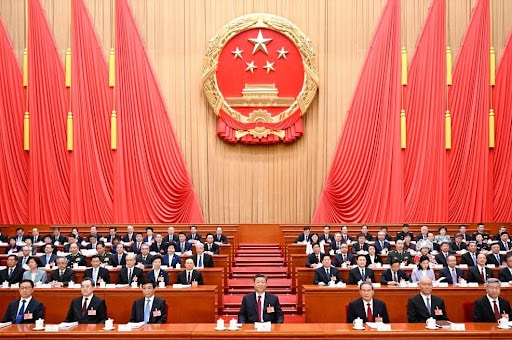Legislative Vote Aims to Challenge ‘Pro-China’ Lawmakers

For many years, Deng Pu viewed himself as an ordinary citizen rather than an activist. However, his perspective shifted dramatically last year due to what he perceived as undemocratic actions by Taiwan’s lawmakers and increasing Chinese influence in the parliament. This Saturday, Taiwan will hold a significant vote to potentially remove over two dozen lawmakers accused of being too closely aligned with China, a movement dubbed “dabamian” or the Great Recall. This unprecedented event could reshape Taiwan’s political landscape while intensifying existing divisions within the society.
Background of the Great Recall
The Great Recall initiative emerged following the January elections, where the Democratic Progressive Party (DPP) won the presidency with William Lai but lost its parliamentary majority to the opposition, primarily the Kuomintang (KMT). In the months that followed, the KMT, along with the Taiwan People’s Party and independent lawmakers, collaborated to block DPP legislation and pass controversial laws. These included measures that limited the powers of the constitutional court and raised the threshold for initiating recall votes. Many Taiwanese citizens expressed outrage, viewing these actions as attempts to undermine the DPP government and bolster the opposition’s power in the Legislative Yuan.
In May 2024, widespread protests erupted under the Bluebird movement, named after a street in Taipei where many demonstrators gathered. Protesters rallied against what they saw as the opposition’s collusion with Beijing and its efforts to push a pro-China agenda within Taiwan’s legislature. Civic groups within the movement began circulating petitions to recall various KMT lawmakers, while KMT supporters retaliated with petitions against DPP lawmakers. Currently, petitions for 31 lawmakers’ seats have garnered enough support to proceed to a final recall vote, all held by the KMT. If successful, this could allow the DPP to regain a majority in the legislature.
The Voting Process and Its Implications
On Saturday, citizens across 24 districts will vote on whether to remove their legislators. The voting question is straightforward: a simple yes or no regarding the recall of each lawmaker. A successful recall requires that more than 25% of registered voters participate, with a majority voting in favor of the recall. If these conditions are met, the seat will be vacated, necessitating a by-election within three months. This requirement emphasizes the importance of voter turnout for the Great Recall’s success, prompting civic groups to mobilize and campaign vigorously for votes.
Deng Pu, now an active participant in the Bluebird movement, has been canvassing for support. He and his fellow activists have been seen outside subway stations, distributing materials urging citizens to vote in favor of the recall. Despite acknowledging that many of the recall votes are taking place in KMT strongholds, Deng believes the effort is essential for correcting what he sees as a flawed democratic process. He emphasizes that the recall is not merely about party politics but about ensuring a parliament that is not beholden to Chinese interests.
Political Tensions and Public Sentiment
The DPP initially distanced itself from the Great Recall but later expressed support, with Lai urging party officials to assist pro-recall groups. This shift has led to accusations from the opposition that the DPP is manipulating the movement for its political gain. The DPP stands to benefit significantly if it can reclaim a legislative majority, even if the KMT ultimately wins in subsequent by-elections.
Opposition rallies against the Great Recall have drawn thousands, with participants condemning the initiative and labeling Lai as authoritarian. Some protesters have likened him to historical figures associated with tyranny, further escalating the political rhetoric. Meanwhile, the Chinese government has also weighed in, accusing Lai of suppressing opposition under the guise of democracy. Amidst this charged atmosphere, many Taiwanese citizens remain uncertain about the implications of the Great Recall, with some expressing confusion over the ongoing political turmoil.
Future of Taiwan’s Political Landscape
Regardless of the outcome of the Great Recall, analysts predict it will have lasting effects on Taiwan’s already polarized society. The political climate has become increasingly hostile, with instances of physical altercations in parliament and activists facing harassment. Reports of forged signatures in recall petitions have also surfaced, complicating the integrity of the process. Experts suggest that the Great Recall could redefine the relationship between voters and their elected officials, making political accountability a more pressing issue.
Political scientists believe that the Great Recall could either reinforce the need for politicians to be responsive to public sentiment or embolden them to act without fear of repercussions. If the recall votes yield close results, it may prompt both the KMT and DPP to seek compromise, which could ultimately benefit Taiwan’s democratic processes. As the nation prepares for this pivotal vote, the future of its political landscape hangs in the balance, reflecting the deep divisions and fervent activism that characterize contemporary Taiwanese society.
Observer Voice is the one stop site for National, International news, Sports, Editor’s Choice, Art/culture contents, Quotes and much more. We also cover historical contents. Historical contents includes World History, Indian History, and what happened today. The website also covers Entertainment across the India and World.
Follow Us on Twitter, Instagram, Facebook, & LinkedIn

